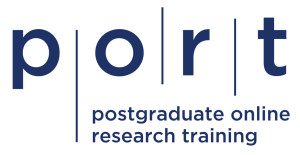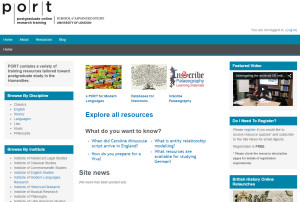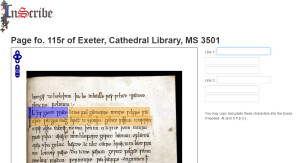Welcome to PORT! [Postgraduate Online Research Training]
The School of Advanced Study provides a whole assortment of training courses, workshops, and events but it’s not always easy or convenient to travel to London to reach them and therefore their scope and impact remains limited. The School hopes that PORT will help to solve this problem, by providing some of these resources online.
What is PORT?
PORT is an online virtual learning environment (or VLE for short). In many ways it is similar to MOOCs such as Coursera and Futurelearn but it is essentially a more ‘traditional’ online tool, presenting resources that can be accessed at any time, dipped into, or completed at any speed. Dr Matt Phillpott, the manager of the new PORT website explains:
‘PORT is directed toward postgraduate study in the humanities – this is of course part of the core mission for SAS – however I see no reason at all why early career researchers or established academics can’t find something of use here. We’ve got a whole range of resources in development, some of which cover basic training needs, while others are introductions to subjects and tools that humanities researchers might well come in contact with at some point in their research. Over time we will build up all kinds of resources including fully fledged courses, short handbooks, and an assortment of videos from SAS events and training sessions.’
On its launch PORT contains three core resources but these will quickly be followed up by more. The initial resources are:
- InScribe Palaeography
- Databases for Historians
- a PORT for Modern Languages
Those familiar with the old Institute of Historical Research’s (IHR) History SPOT website will be familiar with the first two of these, and those familiar with the online training materials provided by the Institute of Modern Languages Research (IMLR) will be familiar with the latter.
History of PORT
Essentially PORT combines the Schools previous successful attempts to create training environments online. The very name of the website is derived directly from IMLR’s old PORT. This site contained a handbook on how to apply for and complete a PhD in Modern Languages, various videos, and an extremely useful catalogue of archival and online resources. Along with the name, IMLR’s training materials now appear on the new PORT as ‘a PORT for Modern Languages’.
In addition the resources developed as part of the History SPOT suite by the IHR will be converted to the new site. These include InScribe (a series of modules on medieval palaeography), and a handbook and course on using and creating databases. In addition the other materials from History SPOT will be appearing on PORT in the near future. These are:
- Data Preservation
- Digital Tools (including modules introducing Semantic Mark-up and Text Mining)
- Podcasts for Historians (which will be redeveloped for Humanities studies in general)
Forthcoming courses
Other courses are also in development as Matt Phillpott describes:
‘We’ve developed the site with the expectation of expansion. When we launch there will only be a few resources available, but these will quickly grow and cover a much wider expanse of training needs. We very much hope that postgraduates will find the resources and materials useful.’
Forthcoming resources in development are:
- Quantitative Methods
- Managing your Research for Historians
- Material Cultures
- Scholarly Editing
- Legal Studies
Almost all of these training materials can be accessed for free. There is no tutor involved, so they can be undertaken whenever the student wishes and followed at a pace that suits them. Most resources on PORT include advice, exercises, and quizzes to help students to learn the material. Alongside these, PORT contains videos, training guides and various other useful materials for postgraduate students.
This is an exciting new direction for the School. Whereas previously individual institutes had developed online training content themselves, now, for the first time, these can all be found in the same place enabling us to strengthen and widen the provision and ensure that it becomes more cohesive and useful to postgraduates across the UK.
You can access PORT via the SAS website or from the research training pages on individual institute websites. Its address is: http://port.sas.ac.uk.



